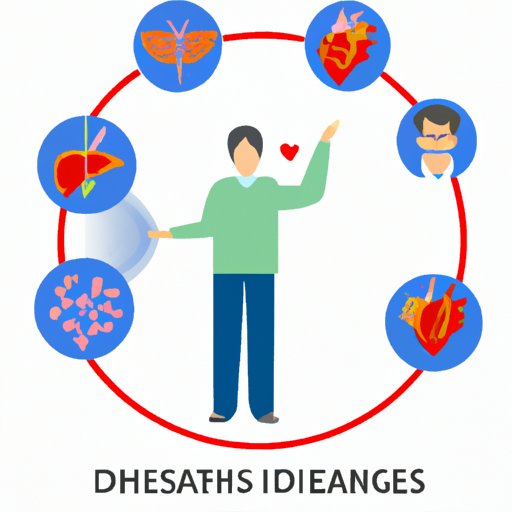
Understanding Diseases and their Impact on Individuals and Society
Diseases have long been a problem for human existence since the beginning of civilization. They have taken many forms, from the common cold to pandemics that have caused mass deaths and has left an indelible mark on the world. Understanding diseases, their nature, and their impact on individuals and society as a whole is vital. This article explores the different types of diseases, their historical significance, their impact on public health, social and economic consequences, risk factors and how to stay safe.
Defining Diseases and Their Different Forms
Diseases are abnormalities in the normal functioning of the human body that causes discomfort, pain, or death. Diseases can be broadly categorized into three types: genetic, infectious, and chronic.
Genetic diseases are usually inherited and are caused by defects in a person’s DNA. Some of the most common genetic diseases include cystic fibrosis, sickle cell anemia, and Huntington’s disease. These diseases can be passed down from parent to child without any symptoms showing up for generations.
Infectious diseases are illnesses that can be spread from one person to another, either through direct contact, airborne, or food and waterborne transmission. Examples include COVID-19, HIV/AIDS, Tuberculosis, and Ebola. These are usually caused by bacteria, viruses, fungi, or parasites that enter the body and disrupt its normal functioning.
Chronic diseases are ailments that last long periods in the body and require constant care or management. These include heart disease, stroke, diabetes, and cancer. Chronic diseases are usually caused by poor lifestyle choices like smoking, poor diet, and lack of exercise.

A Historical Perspective on Diseases
The treatment of diseases has evolved over time. In ancient times, diseases were seen as a punishment by the gods, and treatment was based on supernatural interventions. In the middle ages, the treatment of diseases was based on alchemy and herbal remedies. The rise of modern medicine in the 19th century led to the development of antibiotics, vaccines, and other medical interventions that revolutionized the way diseases were treated.
There have been many milestones in disease research and treatment. One such example is the eradication of smallpox, which was achieved through vaccinations. Another is penicillin, which revolutionized the treatment of bacterial infections.
Impact of Diseases on Public Health
Diseases have a significant impact on public health. According to the World Health Organization, over 24 million people die each year from preventable or treatable diseases.
The focus on public health strategies is on preventing the spread of diseases, diagnosing and treating them early, and managing them efficiently. Some strategies include vaccination, screening for early detection, and educating people on disease prevention and management.
Social and Economic Consequences of Diseases
The impact of diseases extends beyond individuals and into society. Diseases can cause significant social and economic consequences. They can affect a person’s ability to work, resulting in lost wages and a burden to society. They can also lead to the decline of communities and the economy in general.
For example, an outbreak of COVID-19 leads to a fall in the stock market and the loss of millions of jobs worldwide. Businesses have shut down, and many people are facing financial hardships.
Lifestyle Choices and Disease Risk
The link between lifestyle choices and disease risk cannot be ignored. Many chronic diseases are tied to poor lifestyle choices that increase the chances of developing specific ailments.
Smoking, excessive alcohol consumption, a poor diet, lack of exercise, and other hazardous lifestyle choices are risk factors for chronic diseases like diabetes, heart disease, and stroke. Maintaining healthy habits reduces the risk of developing chronic diseases and can improve overall health and wellbeing.
Latest Advancements in Disease Research and Treatment
The advances in technology have significantly improved disease research and treatment. Many developments have been made, including the use of gene editing, personalized medicine, and stem cell therapy.
One of the most promising fields of study in disease research is precision medicine. Precision medicine focuses on developing individualized medical treatment based on an individual’s genetics, lifestyle, and environment. This personalized approach can improve treatment outcomes and reduce the side effects of medication.
Conclusion
Diseases continue to be a significant challenge for individuals and society as a whole. Understanding diseases, their nature, and their impact on the world is vital for staying informed about the latest research and treatment developments. Staying healthy will reduce the risk of diseases and ensure that people live longer and healthier lives.




